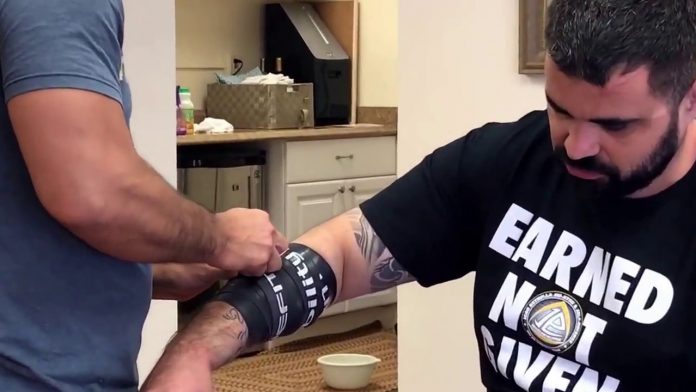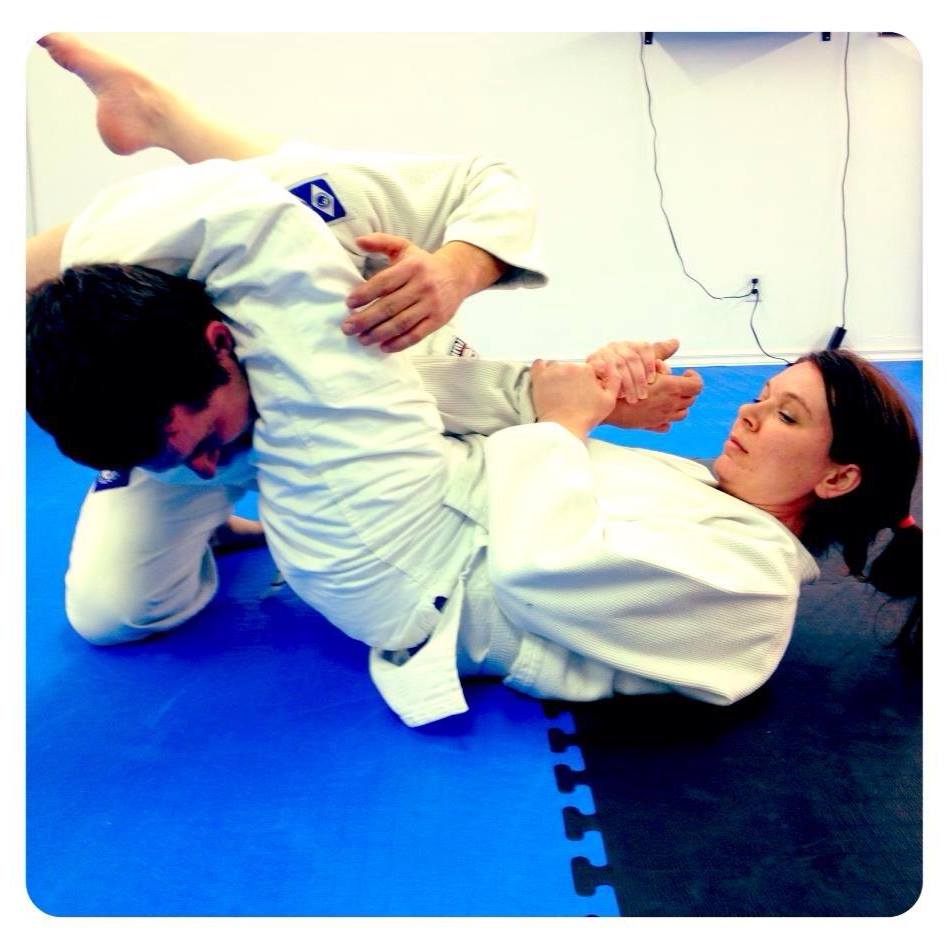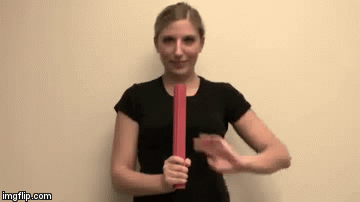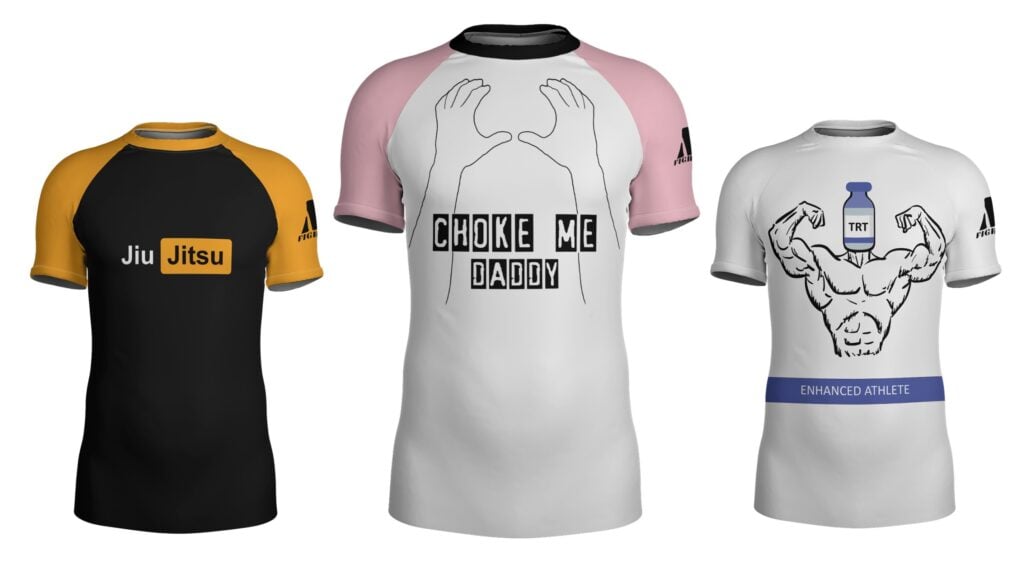
Of all the possible injuries you can sustain training BJJ, the most dangerous ones are those that you don’t take for serious. Hearing something pop or tear usually frightens people enough so they stop training. Some might even see a doctor. However, it is those things that come on from seemingly nowhere that can turn into something potentially debilitating. A great example of this is a very common Jiu-Jitsu injury that often goes undiagnosed: the tennis elbow. This sneaky injury starts off easy but can turn into one of the worst injuries you can get. Here’s how you stop it!
How do you know that an injury you get is a serious one? Well, if that injury has a name that’s not in Latin and you can understand it, it means you need to take care of it. A tennis elbow is an extremely common injury among tennis players (duh). It is also a high-percentage Jiu-Jitsu injury. However, where tennis players usually panic and go straight to doctors and physios, grapplers tend to shrug it off. or so they think. This injury is an inflammatory one and has the potential to turn chronic and extremely serious, Today, we’ll explain it as best we can, along with some simple steps to get rid of it for good.
A Nagging Jiu-Jitsu Injury
The hierarchy of BJJ injuries usually goes something like this: fingers are right at the top, followed closely by knee injuries, with neck and elbow injuries tying for third place. That basically means is that you’re very likely to hurt an elbow when grappling. Normally, there’s a whole host of injuries that can affect the elbow, but some are more common than others.

Moreover, elbow injuries in Jiu-Jitsu do not have to be strictly from trauma. Trauma affects pretty much the same things as knee injuries – ligaments, the joint bursa, cartilage, and tendons. However, with the elbow, inflammatory injuries are much more common. As such, they’re less painful, at least initially than all-out trauma. However, they have the tendency to transform into boring, very painful, and extremely hard to resolve, chronic injuries. The tennis elbow is the perfect example of this.
What Is A Tennis Elbow?
A tennis elbow is an inflammation of the soft tissue structure on the outside of the elbow. Skipping all the doctor talk and the Latin, we’ll just say that it affects mainly tendons, but is also known to engulf the bursa, ligaments and neighboring muscles. This happens due to the constant aggravation of the elbow, which is almost a given if you train Jiu-Jitsu. It is also something that’s more common, but not limited to beginners and /or older grapplers. The result of it – pain.
The way this common Jiu-Jitsu injury manifests is with pain located to the outside of the elbow. there’s no one spot specific for tennis elbow. It may occur at a lot of spots on the outside as a result of inflammation to different, or multiple soft tissue structures. The pain is usually dull, or might even disappear, bar certain moves. However, the moment you do something like, cross collar choke, for example, you’ll get a sharp and painful reminder of your tennis elbow.
The main problem with the tennis elbow in Jiu-Jitsu is that people try to brush it off. That usually leads to worsening, and, eventually turning into a chronic, or worse, a degenerative problem. In essence, the longer you leave it be, the worse it gets, and the harder it is to resolve it. it can even reach a level that stops you from training completely. Diagnosis is not complicated but does require a visit to the doctor.
Easy Way to Fix It
Luckily, when you get your diagnosis for tennis elbow, you can use an easy fix to resolve it. Common ways of treatment include the usual rest and painkillers over time. This is one way of resolving it, but the one variable that annoys grapplers here is time. How much time can you spend not training BJJ? There are certain elbow pads and compression sleeves that can help, but they won’t resolve the issue on their own.
Certain cases of this Jiu-Jitsu injury might even merit cortisone/prednisone shots to relieve the pain. In these cases, follow up physical therapy is also common, after a long, long lay off. In extremely rear cases, there’s even an option for operative treatment.

All that you need is a thick rubber band, that’s shaped like a cylinder. You simply hold it upright with your healthy hand. Use your tennis elbow arm to catch the rubber band on top, grabbing it with the thumb down and knuckles towards your chest. Then just turn with your top hand as much as possible, then extend both arms in front of you, and finish by turning with the other ars as well. Repeat for a few times and your tennis elbow is going to disappear in a matter of days!
Conclusion
Nobody likes having a Jiu-Jitsu injury. When that injury is painful and has the potential of getting worse, it becomes even more of an issue. The tennis elbow is something a lot of grapplers struggle with. There is, however, an easy and practical method of dealing with it. The rubber technique, along with some rest is all but guaranteed to help you resolve tennis elbow once and for all. Try it out, and let us know about your experience!


![Darce Choke Encyclopedia – Origins, Mechanics and Variations [2025] BJJ, choke, Brabo, BJJ Darce Choke, D'arce Choke, Darce BJJ Choke](https://bjj-world.com/wp-content/uploads/2017/11/JungPoirierLeeYahoo-218x150.jpg)









![Leg Entanglement System: X Lock Owen Jones DVD Review [2025] Leg Entanglement System: X Lock Owen Jones DVD Review](https://bjj-world.com/wp-content/uploads/2025/04/leg-entanglement-system-x-lock-owen-jones-dvd-review-218x150.png)
![[WATCH] John Wick Invitational 2 Delivers Viral Suit-Jitsu Spectacle [WATCH] John Wick Invitational 2 Delivers Viral Suit-Jitsu Spectacle](https://bjj-world.com/wp-content/uploads/2025/04/john-wick-invitational-2-suit-jitsu-spectacle-218x150.png)
![Defensive Wrestling for Jiu-Jitsu Pat Downey DVD Review [2025] Defensive Wrestling for Jiu-Jitsu Pat Downey DVD Review](https://bjj-world.com/wp-content/uploads/2025/04/defensive-wrestling-for-jiu-jitsu-pat-downey-dvd-review-218x150.png)

![Mastering Your Sales Eliot Marshall DVD Review [2025] Mastering Your Sales Eliot Marshall DVD Review](https://bjj-world.com/wp-content/uploads/2025/04/mastering-your-sales-eliot-marshall-dvd-review-218x150.png)

![Wrestling For Jiu-Jitsu Shawn Williams DVD Review [2025] Wrestling For Jiu-Jitsu Shawn Williams DVD Review](https://bjj-world.com/wp-content/uploads/2025/01/wrestling-for-jiu-jitsu-shawn-williams-dvd-review-100x70.png)
![Nicholas Meregali No-Gi System DVD Unpacked: A Detailed Review [2024] Nicholas Meregali No-Gi System DVD Unpacked: A Detailed Review](https://bjj-world.com/wp-content/uploads/2024/09/nicholas-meregali-no-gi-system-dvd-unpacked-review-100x70.png)
![Tiny Woman Guide To The Guard Ann Kneib DVD Review [2024] Tiny Woman Guide To The Guard Ann Kneib DVD Review](https://bjj-world.com/wp-content/uploads/2024/11/tiny-woman-guide-to-the-guard-ann-kneib-dvd-review-100x70.png)




![Darragh O’Conaill Crucifix Encyclopedia DVD Review [2024] Darragh O'Conaill Crucifix Encyclopedia DVD Review](https://bjj-world.com/wp-content/uploads/2024/10/darragh-oconaill-crucifix-encyclopedia-dvd-review-100x70.png)

![Baby Shark Guard System Diogo Reis DVD Review [2025] Baby Shark Guard System Diogo Reis DVD Review](https://bjj-world.com/wp-content/uploads/2025/02/baby-shark-guard-system-diogo-reis-dvd-review-100x70.png)

![Back Hacks Yigit Haney BJJ DVD Review [2025] Back Hacks Yigit Haney BJJ DVD Review](https://bjj-world.com/wp-content/uploads/2024/12/back-hacks-yigit-haney-bjj-dvd-review-100x70.png)
![Advanced Chin Control Concepts David Petrone DVD Review [2025] Advanced Chin Control Concepts David Petrone DVD Review](https://bjj-world.com/wp-content/uploads/2025/01/chin-control-concepts-david-petrone-dvd-review-100x70.png)
![Front Headlock and Turtle Escapes Brian Glick DVD Review [2024] Front Headlock and Turtle Escapes Brian Glick DVD Review](https://bjj-world.com/wp-content/uploads/2024/11/headlock-and-turtle-escapes-brian-glick-dvd-review-100x70.png)

![The Empty Half Guard Michael Currier DVD Review [2025] The Empty Half Guard Michael Currier DVD Review](https://bjj-world.com/wp-content/uploads/2025/03/empty-half-guard-michael-currier-dvd-review-100x70.png)

![Basic Closed Guard Jasmine Rocha DVD Review [2024] Basic Closed Guard Jasmine Rocha DVD Review](https://bjj-world.com/wp-content/uploads/2024/11/basic-closed-guard-jasmine-rocha-dvd-review-100x70.png)

![Charles Allan Price Building Workouts For BJJ DVD Review [2024] Charles Allan Price Building Workouts For BJJ DVD Review](https://bjj-world.com/wp-content/uploads/2024/09/charles-allan-price-building-workouts-for-bjj-review-100x70.png)
![Don’t Stand Up Chris Wojcik DVD Review [2024] Don't Stand Up Chris Wojcik DVD Review](https://bjj-world.com/wp-content/uploads/2024/11/dont-stand-up-chris-wojcik-dvd-review-100x70.png)
![Highlight Hip Throws Christian Ozbek DVD Review [2025] Highlight Hip Throws Christian Ozbek DVD Review](https://bjj-world.com/wp-content/uploads/2025/01/highlight-hip-throws-christian-ozbek-dvd-review-100x70.png)
![Slip N Slide Into Victory Julián Espinosa DVD Review [2025] Slip N Slide Into Victory Julián Espinosa DVD Review](https://bjj-world.com/wp-content/uploads/2025/01/slip-n-slide-into-victory-julian-espinosa-dvd-review-100x70.png)
![Mastering The Crucifix Alexandre Pereira DVD Review [2025] Mastering The Crucifix Alexandre Pereira DVD Review](https://bjj-world.com/wp-content/uploads/2025/01/mastering-the-crucifix-alexandre-pereira-dvd-review-100x70.png)
![The Closed Guard Malachy Friedman BJJ DVD Review [2025] The Closed Guard Malachy Friedman BJJ DVD Review](https://bjj-world.com/wp-content/uploads/2025/01/closed-guard-malachy-friedman-bjj-dvd-review-100x70.png)

